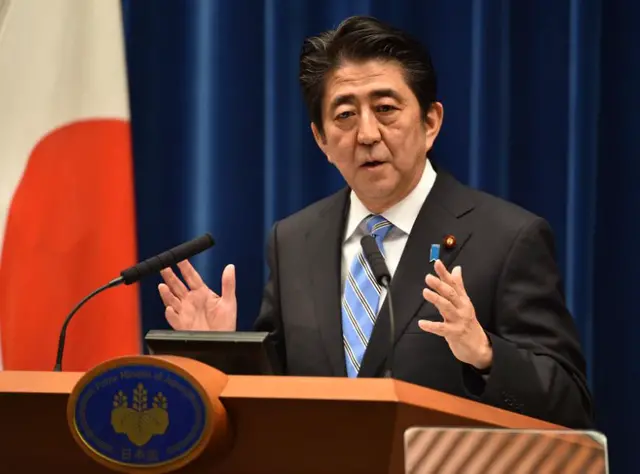Japanese Prime Minister Shinzo Abe has told senior members of his Cabinet and the Liberal Democratic Party that he intends to postpone for 2½ years a planned hike in the consumption tax rate to 10 percent, according to government and LDP sources.
Abe revealed his intention to Deputy Prime Minister Taro Aso, who is also the finance minister; LDP Secretary General Sadakazu Tanigaki; and Chief Cabinet Secretary Yoshihide Suga. He spoke with them at the Prime Minister’s Official Residence on Saturday evening.
Graphic: The Yomiuri Shimbun
The consumption tax rate is currently scheduled to rise to 10 percent in April next year, but Abe now wants to postpone it until October 2019.
Abe also said that the government will maintain its goal of bringing the nation’s primary balance — the total basic fiscal balance of the central and local governments — into the black in fiscal 2020, meaning governmental fiscal health would be regained.
Abe will soon hold a meeting with Komeito leader Natsuo Yamaguchi to discuss the final stage of internal negotiations.
In the talks with Aso and others, Abe made remarks based on views he shared with the other leaders of the Group of Seven major countries when they met for the G-7 Ise-Shima summit. Abe said they agreed that “the global economy faces risks.”
The government and ruling parties had previously coordinated opinions on how long the tax hike would be postponed, and agreed on two years. However, Abe now plans to postpone it for 2½ years.
The prime minister’s Abenomics economic policies have been losing steam. Abe judged that the tax hike should be postponed for as long as possible so the nation can escape from deflation, sources said.
Because a House of Councilors election will be held in summer 2019, some ruling party members have voiced concern that if the tax hike was postponed for two years, the upper house election would be held just after it took effect. Abe likely considered opinions within the ruling parties.
Regarding the plan to regain governmental fiscal health, an aide of Abe’s presented the view that an “economic upturn from the 2020 Tokyo Olympics could minimize any negative impacts stemming from the tax hike.”
Abe’s intention to bring the primary balance into the black is based on the assumption that the consumption tax rate is 10 percent. Thus, it is possible that the government will review this plan.
Since the inauguration of the second Abe Cabinet in December 2012, the consumption tax rate has been raised from 5 percent to 8 percent, in April 2014.
The rate was then scheduled to increase to 10 percent in October 2015, but in November 2014 Abe announced a 1½-year postponement. He then dissolved the House of Representatives and achieved an overwhelming victory.
At that time, Abe affirmed that the consumption tax rate hike to 10 percent would never be postponed again. In a relevant law, he deleted a clause regarding the conditions for postponing the next tax hike should economic conditions worsen.
Aso places great importance on regaining fiscal health and has repeatedly made negative remarks about postponing the tax hike again. “Aso may not be easily convinced,” a Finance Ministry official said.
Komeito is also cautious, because the party has played a leading role in establishing the reduced consumption tax rate on certain items that is to be introduced when the standard rate is increased to 10 percent.
Abe intends to build consensus within the government and ruling parties, although opposition can be expected.
Opposition parties called Sunday for Prime Minister Shinzo Abe to resign if he breaks his pledge to implement a 2-percentage-point consumption tax hike scheduled for April 2017.
Main opposition Democratic Party acting Secretary General Tetsuro Fukuyama said during an NHK television program that Abe and his Cabinet should resign if he does not fulfill his pledge and pushes the tax hike back to October 2019. Officials from the Japanese Communist Party and the Social Democratic Party backed Fukuyama’s demand.
During the same NHK program, Liberal Democratic Party acting Secretary General Yasufumi Tanahashi asked for public understanding over the likely postponement.
“It is a matter of course that (Abe) will deal with the situation flexibly under the circumstances that tax revenues are unlikely to increase in the mid- and long-terms,” Tanahashi said.
Tetsuo Saito, acting secretary general of the LDP’s coalition ally Komeito, said his party had been left out of discussions and he had heard “nothing” about a postponement. He said he will decide on a response after discussions with the LDP.
On Saturday evening, Abe brought up the possibility of a postponement during talks with Finance Minister Taro Aso, Chief Cabinet Secretary Yoshihide Suga and LDP Secretary General Sadakazu Tanigaki, according to sources close to the matter.
Aso told an LDP meeting in Toyama on Sunday that Abe would need to dissolve the House of Representatives for a general election if he postponed the tax hike. “Unless a lower house election is held to seek voters’ verdict, it would not make sense,” the finance minister said.
The sources said Aso and Tanigaki demanded that a general election be held at the same time as a House of Councillors election expected in July if Abe postpones the tax hike, but the prime minister did not make clear whether he supported the idea.
(THE YOMIURI SHIMBUN, JAPAN TODAY)
 简体中文
简体中文







